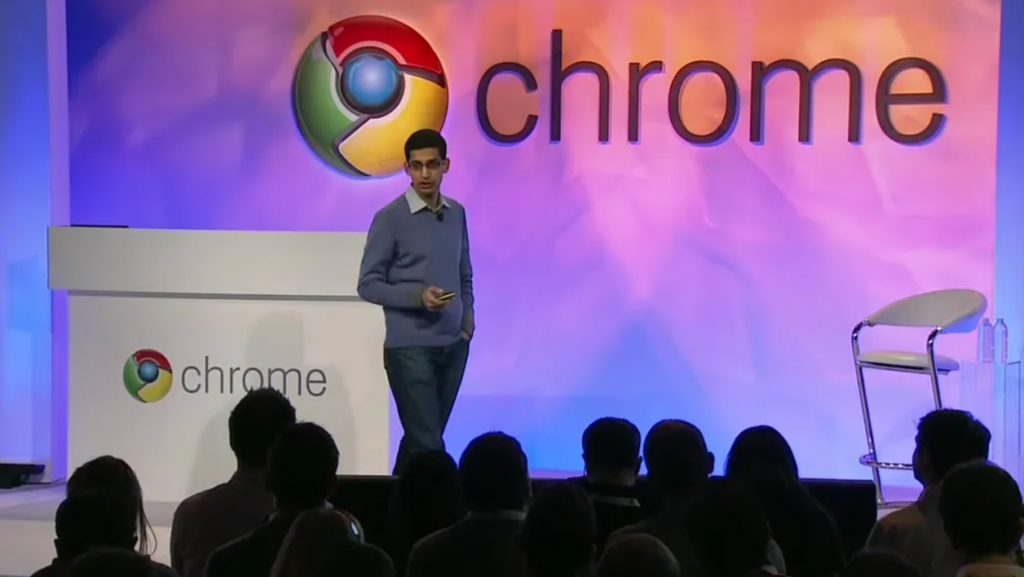
Sundar Pichai – leader of one of the world’s largest companies. The CEO of Google and its parent company Alphabet has made his way up the ranks during his illustrious 17-year stint with the company. His accomplishments are many and he is responsible, in part, for many of the Google services that millions use every day. For the countless that use Chrome and/or Chrome OS on a daily basis, here’s a little history lesson for you. In 2010, Sundar took that stage as the Product Management Lead for Chrome and announced what was new with the fledgling browser that would become a global powerhouse. During that talk, Mr. Pichai announced the rollout of the Chrome OS Pilot Program. Chrome OS began development about a year prior but now, Google wanted to get actually Chrome OS devices into the hands of developers for testing and improvements. Hence, the Cr-48 was born. Check out the video below if you’d like to take a quick look back at that day.
Over the past ten years, Chrome OS has come a long way. We won’t go deep into the evolution of the platform. If you’d like to learn more, you’re currently on a site that is literally dedicated to Chrome OS. For years, Chrome OS has been criticized for any number of deficiencies and shortcomings but we are excited to frequently share that most of those arguments are no longer valid. You can now easily print from any Chromebook and all current-gen devices now have access to the Google Play Store and millions of Android applications. Users can install and run Linux applications and enterprise clients even have access to locally run Windows virtual machines thanks to a partnership with Parallels. Love it or hate it, you can’t deny that Chrome OS is coming into its own and has matured well beyond the “browser only” experience that it once was.
That said, one area where Chrome OS users are still looking for answers is the ongoing support of devices that have reached the end of life. Granted, Google has made massive strides in this department as new Chromebook models to market are required to receive updates to Chrome OS for no less than eight years from the initial release of the hardware. That’s great but what about devices that are sitting on shelves that still have capable hardware but are no longer being updated? That was the exact question that was posed during a Q&A at yesterday’s Media session for the celebration of the 10th birthday of Chrome OS.
While Google didn’t give a direct response, the director of product management of ChromeOS Alexander Kuscher stated that Chrome OS developers were “working under the hood” to make sure that the browser on Chrome OS was always up-to-date. That’s about all the detail we were given but it was enough to convince us that the “LaCrOS” project is what he was referring to. LaCrOS is an effort to separate the Chrome browser from the Chrome operating system so that, when a device reaches End of Life, the browser can still receive crucial updates and provide a safe and secure browsing experience for users that don’t want to scrap a perfectly good laptop.
This didn’t come as much of a surprise to us but Google has yet to officially share any information about LaCrOS or the split between Chrome and Chrome OS. However, as I scrolled through Twitter last night, I came across a tweet from Sundar Pichai that reinforces our belief that this is exactly what is happening. In the tweet, Google’s CEO shared a pic of the iconic Cr-48 and made mention of his time working on the device. He goes on to say that it “might be time to update to the latest version of Chrome.”
For those unfamiliar with the inner workings of Chrome OS, this tweet may seem like an insignificant nod that simply signifies the 10-year anniversary of the operating system. Given the information shared during the virtual event and the extensive work being done on LaCrOS, we think that there is much more to this little tweet than meets the eye. If you ask me, Sundar just spilled the beans that we will eventually see a free-standing version of Chrome on the Chrome operating system. The fact that he shared this and the recent news that Chrome will soon run on a new update schedule has me believing that Chrome and Chrome OS will soon be two distinct entities in one ecosystem and that is very good news for Chromebook users everywhere. Mr. Pichai, if you’d like to confirm this, we’d love to have you on a future episode of The Chrome Cast. Just drop us a line.
























